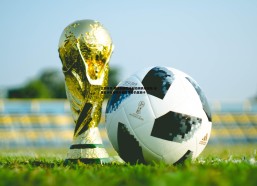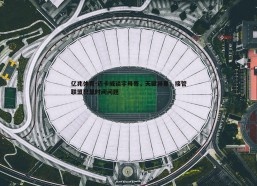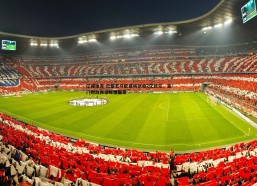在欧洲冠军联赛的历史长卷中,西班牙球队始终占据着举足轻重的地位,自1992年欧冠改制以来,西班牙俱乐部不仅屡次捧起奖杯,更在参赛次数上展现出惊人的统治力,皇家马德里和巴塞罗那以各30次的参赛记录并列榜首,而马德里竞技则以16次的成绩稳居第三,这一数据不仅凸显了西甲联赛的竞争力,更反映了西班牙足球在欧洲舞台上的持久影响力,本文将深入探讨这一现象,分析其背后的原因,并展望未来趋势。
欧冠改制背景与西班牙球队的崛起
欧洲冠军联赛于1992年由欧洲冠军杯改制而来,旨在扩大赛事规模和提高商业价值,改制后,参赛队伍数量增加,赛制更加规范化,为欧洲顶级俱乐部提供了更多展示机会,西班牙球队迅速适应了这一变化,并凭借其深厚的足球文化和强大的经济实力,成为欧冠的常客,皇马和巴萨作为西班牙足球的双雄,自然成为这一趋势的引领者,他们的成功不仅源于历史底蕴,更得益于持续的投资和青训体系的完善。
皇马自改制以来从未缺席欧冠,这得益于其“银河战舰”战略和稳定的管理,俱乐部通过引进世界级球星如齐达内、C罗和本泽马, combined with a focus on youth development, has ensured consistent performance.亿兆体育 Similarly, Barcelona's La Masia academy has produced legends like Messi, Iniesta, and Xavi, making them a force in Europe. Meanwhile, Atlético Madrid, under the guidance of Diego Simeone, has transformed into a defensive powerhouse, regularly qualifying for欧冠 through tactical discipline and resilience.

皇马和巴萨:30次的辉煌纪录
皇家马德里和巴塞罗那各30次进入欧冠正赛,这一数字远超其他欧洲豪门,皇马的欧冠之旅充满了传奇色彩,他们共赢得了14座冠军奖杯,是赛事历史上最成功的俱乐部,自改制以来,皇马不仅保持了参赛记录的完整性,更在2016年至2018年间实现了三连冠的壮举,这一成就离不开主席弗洛伦蒂诺·佩雷斯的远见和教练齐达内的战术智慧,球队的进攻火力和关键时刻的应变能力,使其成为欧冠赛场的常胜将军。
巴塞罗那同样不容小觑,他们以5座改制后的欧冠奖杯紧随皇马之后,巴萨的tiki-taka战术在瓜迪奥拉时代达到了巅峰,2009年和2011年的欧冠冠军便是明证,球队注重控球和技术流打法,吸引了全球球迷的关注,尽管近年来巴萨经历了一些动荡,如梅西的离队和财务危机,但他们依然通过青训和引援维持了欧冠资格,年轻球员如佩德里和加维的崛起,为球队注入了新的活力。
这两支球队的成功也受益于西甲联赛的整体水平,西甲以其技术性和进攻足球著称,为皇马和巴萨提供了高质量的竞争环境,电视转播收入和商业开发使它们能够保持财务健康,从而在欧冠中持续投入。
马竞:16次的坚韧之旅
马德里竞技的16次欧冠参赛记录虽不及皇马和巴萨,但同样值得尊敬,马竞的传统风格以防守反击为主, under Simeone, they have become known for their grit and organization. 球队在2014年和2016年两次闯入欧冠决赛,虽均惜败于皇马,但展现了强大的竞争力,马竞的 success is built on a foundation of teamwork and tactical discipline, rather than individual star power. 球员如格列兹曼和奥布拉克 have been key to their欧冠 runs.
马竞的欧冠之旅并非一帆风顺,早期,球队 often struggled to qualify due to competition from other Spanish clubs. However, since Simeone took over in 2011, they have become regulars in欧冠, often reaching the knockout stages. 他们的故事体现了西班牙足球的多样性——并非所有球队都依赖进攻,防守同样可以带来成功,马竞的崛起也促进了马德里城市的足球文化,使西班牙首都成为欧洲足球的重要中心。
其他西班牙球队的贡献
Beyond the top three, other Spanish clubs have also made their mark in欧冠. Valencia, for example, reached two finals in the early 2000s, while Sevilla, though more successful in the Europa League, has occasionally qualified for欧冠. These teams contribute to Spain's overall coefficient, ensuring that La Liga retains multiple欧冠 spots. The collective strength of Spanish football is a key reason why皇马、巴萨和马竞 can maintain such high participation rates.
原因分析:为什么西班牙球队如此成功?
西班牙球队在欧冠中的成功可归因于多个因素,青训系统(如La Masia)培养了大量人才,使俱乐部能够保持竞争力 without excessive spending. Second, the tactical innovation in Spanish football, from tiki-taka to Simeone's defensive schemes, has kept teams adaptable. Third, financial stability from TV rights and global branding allows clubs to attract top players. Finally, the passion for football in Spanish culture drives clubs to prioritize European success.
Moreover, the structure of La Liga, with its emphasis on technical skills, prepares teams well for欧冠's high-pressure matches. The rivalry between皇马 and巴萨 also pushes both clubs to excel, creating a cycle of continuous improvement.
未来展望与挑战
Looking ahead, Spanish teams face challenges from emerging forces like Premier League clubs, which have greater financial power. However,皇马、巴萨和马竞 are adapting by focusing on youth development and strategic signings. For instance,皇马's acquisition of young stars like Jude Bellingham ensures long-term sustainability.巴萨, despite financial woes, continues to bet on La Masia graduates.马竞's model of resilience remains effective.
The future of Spanish football in欧冠 looks bright, with the potential for more clubs like Real Sociedad or Villarreal to make occasional deep runs. As欧冠 continues to evolve, Spain's rich history and adaptability will likely keep its teams at the forefront.

西班牙球队在欧冠改制以来的表现堪称传奇,皇马和巴萨以30次参赛领跑,马竞以16次紧随其后,这不仅体现了俱乐部的辉煌,更展示了西班牙足球的整体实力,通过青训、战术创新和财务管理,这些球队已成为欧洲足球的标杆,随着足球世界的变化,西班牙俱乐部将继续书写他们的欧冠故事, inspiring fans and players alike. The journey is far from over, and the world will be watching to see what comes next.
















发布评论